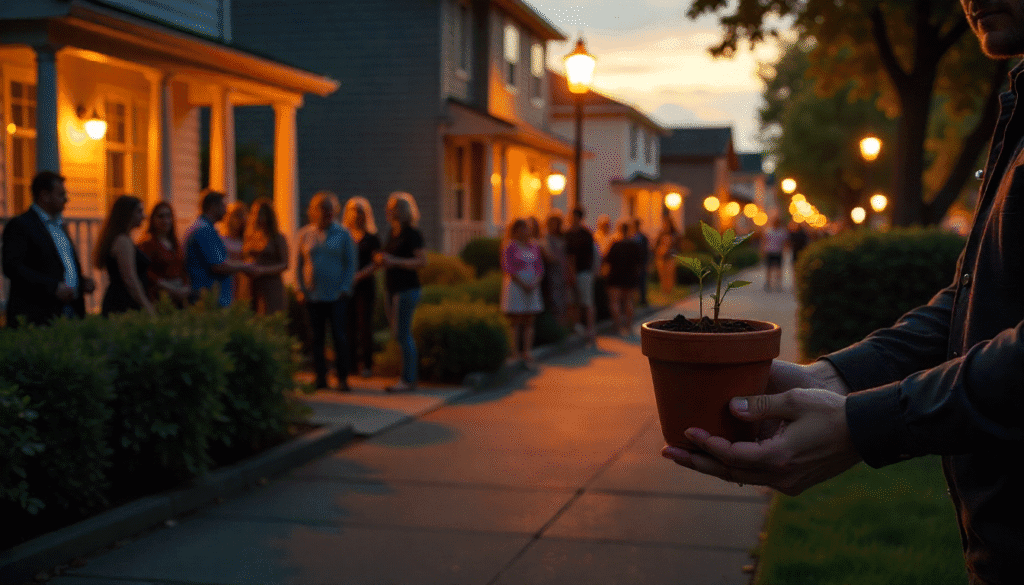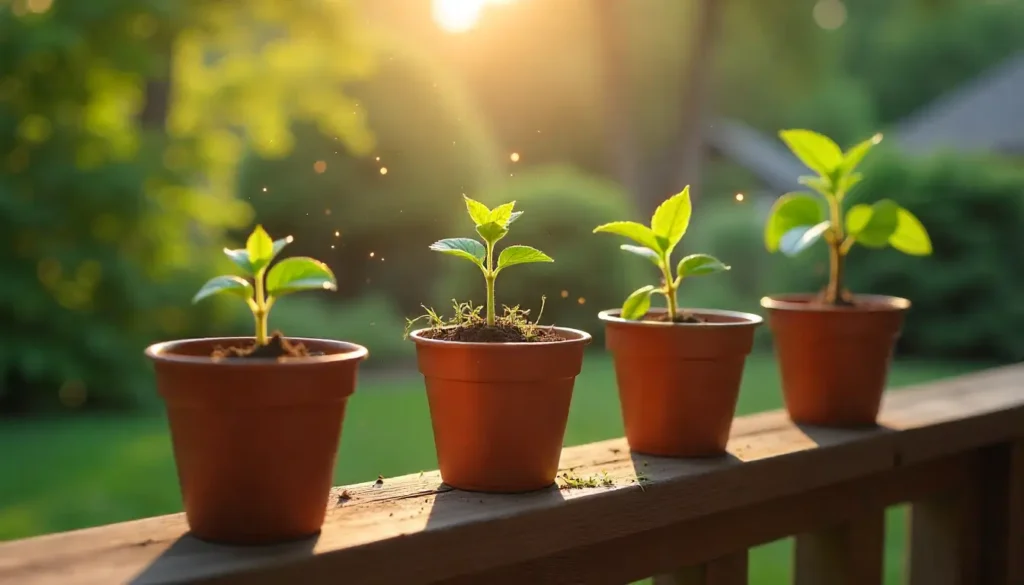The announcement on the neighborhood bulletin board was simple enough: “Cedar Street Contest: Care for your seed. Watch it grow. Win a prize.”
It sounded harmless. But when the clay pots arrived a week later, no one was quite ready for the chaos. Some houses received three seeds, stacked neatly; others, like Jack’s, only one; a few received nothing at all. Children squealed, parents debated, and whispers began: “Did you see the Johnsons? Their plant is already taller than the porch!”

Jack knelt beside his single pot. “Looks small, huh, Emma?” he said, brushing dirt from the rim.
Emma, his nine-year-old daughter, leaned close. “It’s okay. Maybe it’s shy.”
Jack chuckled. “Or maybe it knows we don’t rush things.”
Unlike the Instagram photos that flooded the neighborhood feed, Jack’s plant showed nothing for days. Leaves twitched faintly in the morning breeze, stems quivered, but no dramatic growth occurred. Across the street, neighbors were already fretting, measuring stems with rulers, adjusting light, even debating soil temperature.
Mrs. Harper, the unofficial neighborhood guru, peered over her fence. “Some pots behave strangely,” she said. “A few sprout quickly… but others—” She shook her head. “They just… linger.”

Weeks passed. Jack and Emma tended their pot each evening, not with charts or schedules, but quietly. Emma hummed little songs. Jack read aloud from her picture book. Sometimes they spoke; sometimes they simply sat, hands brushing the soil, listening.
Meanwhile, on Elm Street, Mr. Benson had two pots. One thrived, bursting into a tangle of glossy stems; the other drooped despite every fertilizer he tried. Across Cedar Street, a family with three pots found one bloomed gold, another browned overnight, and the last simply refused to move. The neighborhood murmured about unfairness, but Jack didn’t mind.
One afternoon, Jack noticed a faint shimmer at the base of the pot. He leaned closer. “Emma… do you see that?”
Emma gasped. Tiny buds had appeared along the stem, almost translucent, catching sunlight like fragments of glass. “It’s… magical,” she whispered.
Jack smiled, but didn’t overreact. “Patience,” he reminded himself. “We just keep showing up.”

By the end of the month, subtle patterns emerged. Plants that had been fussed over, forced, or rushed either wilted or grew strangely crooked. Only those nurtured quietly, with gentle care, attention, and presence, began to produce healthy blossoms. The “magical fruit” that eventually appeared seemed to glow faintly in sunlight. Those who tasted it felt a warmth in their chest, a quiet happiness that lingered far longer than ordinary sweetness.
The neighborhood gathered for judging. Towering stems loomed, some glittering with golden blossoms, others collapsed under their own ambition. Jack’s humble pot sat in the middle of his porch. When Emma held it up, a single, shimmering fruit swung gently from the stem, light reflecting off its skin like liquid sunshine.
“Jack?” Mrs. Harper whispered. “How did you—?”
He shrugged, cheeks warm. “We were there. Every evening. No rushing. No pressure. Just… being.”
Emma beamed. “We talked, we laughed, we just cared.”
The mayor cut the fruit open. It radiated a soft glow. Those nearby felt a calm spread through their bodies, as if tension and worry had quietly melted away. Eyes softened, voices slowed. Even the plants that hadn’t borne fruit seemed to nod in the breeze, as if acknowledging the lesson.
Later, while neighbors debated formulas and techniques, Jack and Emma sat quietly on their porch. Another bud had emerged, unseen at first glance. Jack realized that the fruit’s magic wasn’t in speed, or in multiple seeds, or even in strict attention. It was in presence, patience, and quiet acceptance—the invisible ingredient that nourished growth over time.
And somewhere across the street, another family’s struggling plant finally unfurled a single golden blossom. The magic didn’t belong to one home. It belonged to anyone willing to show up.
Jack tucked his hands into his lap, Emma beside him, and smiled. The contest might end soon, the ribbons might be pinned, but the true growth—the kind that lasts—had just begun.
Unpacking the Parable: What This Story Teaches About Parenting
The tale of the mysterious neighborhood competition is more than a magical fable—it is a mirror held up to the everyday journey of raising children. Each detail of the story carries a truth about parenting that often hides in plain sight. Let’s explore what each element really means.
The Distribution of the Pots: Parenting Isn’t Equal
In the story, every household received pots of identical size, yet the contents were uneven—some had several sprouts, others just one, and some none at all. This reflects the reality of parenting: families start with different circumstances. Some parents face multiple challenges at once, while others seem to have an easier path. Just like the neighbors, we may be tempted to compare, but parenting never begins on perfectly even ground.
The Slow Growth of the Plants: Children Develop at Their Own Pace
The plants in the story did not grow overnight; some stretched upward quickly, while others lagged behind. This echoes the truth that children grow, learn, and mature at different speeds. One child might excel in language, another in empathy, another in physical ability. The parable reminds us that rushing the process or comparing progress only robs us of the chance to appreciate growth in its own time.
The Withered Plant by the Window: The Struggle All Parents Face
The image of the father and his daughter watching their plant wilt carries the weight of frustration parents often feel. No matter how hard we try, there are seasons when our efforts seem not enough. Every parent knows the sting of doubt—“Am I failing my child?” This moment in the story shows that parenting is not about perfection, but about presence even in the struggle.
The Hidden Ingredient: Love Beyond Possession
When the father and daughter began caring for the plant with gentle attention—patience, acceptance, and presence—the magic was revealed. This is the heart of the parable. Parenting thrives not on control, worship, or possessiveness, but on healthy love: steady, kind, and without rush or judgment. It is this ingredient that nourishes the roots of a child’s well-being.
The Golden Fruit: The Joy of Raising a Whole Child
The fruits in the story were not ordinary; they glowed with a radiance that filled the neighborhood with wonder. This symbolizes the deep joy of raising children who feel loved, accepted, and free to grow into their true selves. The fruit is not perfection or achievement; it is happiness, resilience, and the quiet satisfaction of seeing a child flourish because their roots were nourished with love.
The Contrast Between Pots: Every Family Has Its Own Journey
Even though the pots looked the same, their results were drastically different. This reminds us that parenting is never a one-size-fits-all journey. What works for one family may not work for another. The parable calls us to honor our unique paths instead of measuring ourselves against others.
The story is magical, yes—but it carries a practical message: in parenting, the tools and containers may look the same, but the real difference lies in the unseen ingredient. When children receive patience, presence, and acceptance, they bear fruit that lights the world.
